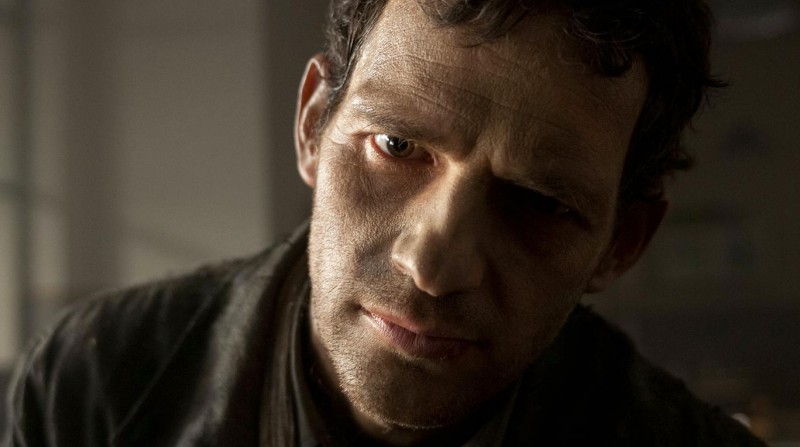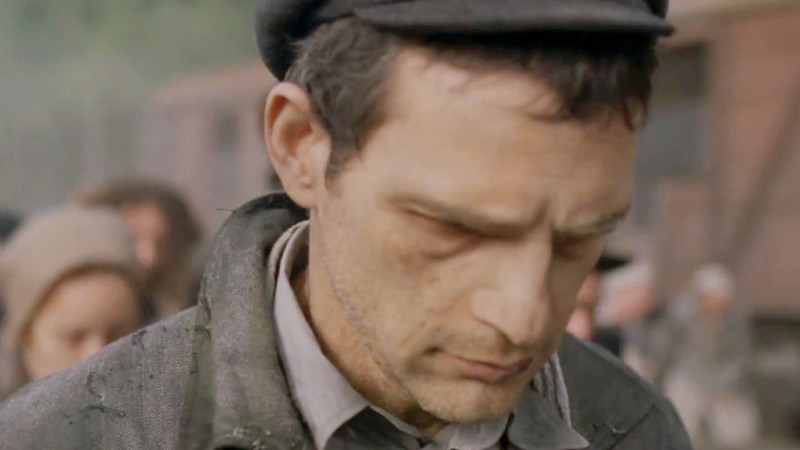Son of Saul Review
"FIrst-time feature film director, László Nemes, provides an utterly horrifying perception of the pits of humanity."
From the moment this film begins, you feel trapped. You are crammed against the face of the film’s protagonist. You are not privy to what is going on, yet you watch hastily. Your viewpoint thrashes around with a sense of urgency. However, you remain focused on the dehumanized characteristics of those within your viewpoint. There appears to be a power shift between the individuals within the room – well-dressed guards provide instructions over the shoddily-placed workers. The workers begin to scamper around in an emotionless trance. Then the signal is given. You watch as hundreds of beings are paraded into a small room and are instructed by the guards to disrobe from their clothes. The previously bustled workers now lie motionless as the naked bodies are corralled an adjacent room. All are given promises of a quick return. The doors are quickly fastened shut. Any feeling that had remained has now evaded the room. For a few moments, the surrounding world is placed in a catatonic state. The silence is quickly overcome by helpless shrieks that plead for a soul nearby to assist. While human beings are in the vicinity - humanity is not present. The horrific thrills only last for less than one human minute – yet we are no longer in a world accompanied by such beings. To you, the sense of hopeless lasts a lifetime. Before you are able to compartmentalize the visual occurrence, another signal is given. The workers regain their sense of purpose. You watch as bodies are dragged from the nearby room and the clothes are scavenged through. Remnants are fully removed. All evidence is disposed as if nothing had occurred. Their world now starts again.

Once the horrifying scene is able to become etched in your inner conscience, you become privy to pertinent information. The being whom your focus follows is named Saul. He has been taken prisoner within the so-called work camp of Auschwitz-Birkenau. Saul has been gifted the designation as a Sommerkomando – prisoner-workers who assist in the camp in exchange for more rations and a few months more of “existence.” The Sommerkomando serve as secret agents for the outside world. Their mission (other than of mere survival) is to gather evidentiary pieces to catalog and inform on the events within these camps.
First time director, László Nemes, attaches his viewers to Saul like a parasite. We are chosen (without input) to invade what is left of his personal space. Our viewpoint lingers without apology, creating a sense of uneasiness. Camera angles shatter about within obtuse viewpoints. This is purposeful directing from Nemes. He fully comprehends the contrasting dynamic between the myriad of inner emotions and the outermost motionless façade. The audience is placed at this apex.

This story isn’t mine to tell – by placing any further input in the limelight, I would be doing it an injustice. Nemes’ direction is phenomenal. I have yet to ponder any comparison, and I hope to never find one. This point in our history is so unique and so horrifying that it should be re-told with the same delivery. Nemes is intimately masterful in intertwining of monotonous movements with glimpses of human emotion and perseverance. He is able to take the crux of humanity and dissolve it until it is no longer visible to the naked eye. Yet, as we are thrusted into Saul’s world – we know it is there, somewhere. We rely on faith to take us through.
This film is a cinematic masterpiece. Every movement of the camera has a purpose. Every purpose, however, constantly battles against a sense of displacement. It is here that Nemes’ places us throughout this film. We are confused from a sensory perspective, although we continue on in hopes of understanding. While what occurs within this film is without question horrific, we become better for taking part in its journey.
Pros
- Purposeful debut film where the audience can learn about a horrific point in our history
- Tactical camera movements create one of the most unique cinematographic experiences.
Cons
- A horrifying realistic experience may be too difficult for some viewers
 Once the horrifying scene is able to become etched in your inner conscience, you become privy to pertinent information. The being whom your focus follows is named Saul. He has been taken prisoner within the so-called work camp of Auschwitz-Birkenau. Saul has been gifted the designation as a Sommerkomando – prisoner-workers who assist in the camp in exchange for more rations and a few months more of “existence.” The Sommerkomando serve as secret agents for the outside world. Their mission (other than of mere survival) is to gather evidentiary pieces to catalog and inform on the events within these camps.
First time director, László Nemes, attaches his viewers to Saul like a parasite. We are chosen (without input) to invade what is left of his personal space. Our viewpoint lingers without apology, creating a sense of uneasiness. Camera angles shatter about within obtuse viewpoints. This is purposeful directing from Nemes. He fully comprehends the contrasting dynamic between the myriad of inner emotions and the outermost motionless façade. The audience is placed at this apex.
Once the horrifying scene is able to become etched in your inner conscience, you become privy to pertinent information. The being whom your focus follows is named Saul. He has been taken prisoner within the so-called work camp of Auschwitz-Birkenau. Saul has been gifted the designation as a Sommerkomando – prisoner-workers who assist in the camp in exchange for more rations and a few months more of “existence.” The Sommerkomando serve as secret agents for the outside world. Their mission (other than of mere survival) is to gather evidentiary pieces to catalog and inform on the events within these camps.
First time director, László Nemes, attaches his viewers to Saul like a parasite. We are chosen (without input) to invade what is left of his personal space. Our viewpoint lingers without apology, creating a sense of uneasiness. Camera angles shatter about within obtuse viewpoints. This is purposeful directing from Nemes. He fully comprehends the contrasting dynamic between the myriad of inner emotions and the outermost motionless façade. The audience is placed at this apex.
 This story isn’t mine to tell – by placing any further input in the limelight, I would be doing it an injustice. Nemes’ direction is phenomenal. I have yet to ponder any comparison, and I hope to never find one. This point in our history is so unique and so horrifying that it should be re-told with the same delivery. Nemes is intimately masterful in intertwining of monotonous movements with glimpses of human emotion and perseverance. He is able to take the crux of humanity and dissolve it until it is no longer visible to the naked eye. Yet, as we are thrusted into Saul’s world – we know it is there, somewhere. We rely on faith to take us through.
This film is a cinematic masterpiece. Every movement of the camera has a purpose. Every purpose, however, constantly battles against a sense of displacement. It is here that Nemes’ places us throughout this film. We are confused from a sensory perspective, although we continue on in hopes of understanding. While what occurs within this film is without question horrific, we become better for taking part in its journey.
This story isn’t mine to tell – by placing any further input in the limelight, I would be doing it an injustice. Nemes’ direction is phenomenal. I have yet to ponder any comparison, and I hope to never find one. This point in our history is so unique and so horrifying that it should be re-told with the same delivery. Nemes is intimately masterful in intertwining of monotonous movements with glimpses of human emotion and perseverance. He is able to take the crux of humanity and dissolve it until it is no longer visible to the naked eye. Yet, as we are thrusted into Saul’s world – we know it is there, somewhere. We rely on faith to take us through.
This film is a cinematic masterpiece. Every movement of the camera has a purpose. Every purpose, however, constantly battles against a sense of displacement. It is here that Nemes’ places us throughout this film. We are confused from a sensory perspective, although we continue on in hopes of understanding. While what occurs within this film is without question horrific, we become better for taking part in its journey.